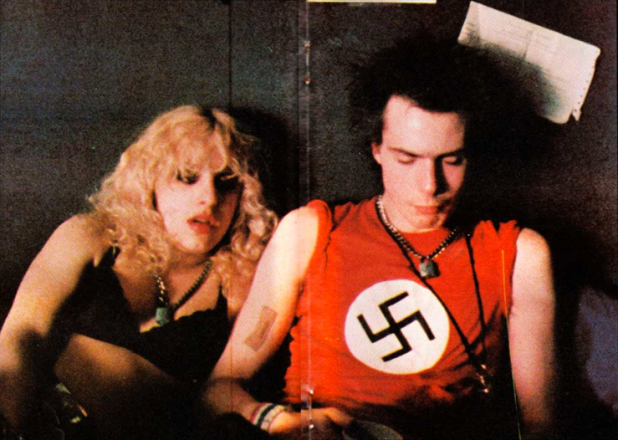Our Spilt Milk: Punk is D.O.A.; "Raffish" Writers Look for Self-Realization

Our favorite things this week include the 1981 punk documentary and the first issue of the New Orleans' creative writing, "The Raffish."
D.O.A.: A Right of Passage is a guerrilla film down to the spelling mistake (I assume) in its title. The 1981 documentary on British punk by Lech Kowalski appears to have been improvised, starting with its pretentious opening with a bird’s eye view of a child being christened, juxtaposed with a woman with chipped nail polish putting a stack of singles on a turntable. Once the baby cries and the title logo literally falls apart, the camera finds a bunch of punks sitting around in America while Iggy Pop’s “Nightclubbing” plays. Nothing tells you where Kowalski’s cameraman is or why he’s there. The giveaway that he’s in America is that most of the punks’ looks say “costume” more than “fashion,” and most could still dress for their usher job at the theater at the mall with five minutes’ notice.
D.O.A. started as a documentary on The Sex Pistols’ brief tour of America in 1979, and the tour gives the movie its nominal through-line. Those scenes give viewers and audience’s eye view of the band in its rickety glory, but Kowalski didn’t have the access to get enough footage to make that film. He and his crew padded out live footage with interviews with the fans and curiosity seekers who turned up at the shows. When that wasn’t enough, Kowalski went to London where he shot more fans, X-Ray Spex, Generation X, Sham 69, and The Rich Kids. The one interview he got with a Pistol came in the form of a nodding, incoherent Sid Vicious in bed with Nancy Spungeon. That footage has a grim electricity because both would be dead a year later, Spungeon stabbed in a room much like the one she was in, possibly by Sid.
The resulting film might be a mess, but it might be avant-garde in its approach to storytelling. Frequently, you don’t know where you are in a scene and you rarely know who’s talking, but you’re rarely lost. Kowalski captures punk’s aspirations, shortcoming, and contradictions, even if it sometimes seems like he got their with more luck than skill. But as Mickey Rourke says in Barfly, “That counts too.”
The DVD comes with a second documentary that focuses on the ad hoc nature of the filmmaking down to its funding from High Times publisher Tom Forcade. It’s very much a talking heads with Punk magazine’s John Holmstrom as the main head, but it’s a pleasant success—a tale of ’70s excess and culture clashes that doesn’t demystify the movie that inspired it. (Alex Rawls)
In 2017, an incarcerated peer mentor in Illinois, a sustainability blogger based in L.A., and a retired grandma in the American West pondered the same two questions: How do you become the most realized version of yourself? And what do you have to sacrifice to get there?
Their responses, in the form of essays and poems, can be found in the first issue of The Raffish, a new NOLA-based lit mag “featuring the work of under-resourced writers and artists, and content which chronicles the diverse human experience and all things raffish” (“raffish” being anything that attractively doesn’t give a fuck).
“I thank God I came to prison,” writes the peer mentor Richard Pizzello in “New Life,” one of three essays from incarcerated contributors. “My life was saved.” Previously a life-long gang member, his sentence was “when my process began. I’d lost everyone and everything. I came to the end of Self.” In the poem “The Nine” by blogger Katey Hawley, the speaker digs deep from the belly of the Earth to deliver herself from a ready-made life as a fetishized but neglected muse. “I took the long way up...It wasn’t god, but myself/That I met on the other side.”
Other contributions include part of a memoir about four years in ‘50s/‘60s Catholic school—spoiler, it was deeply unpleasant and involved being taught that an erection is “Satan’s pointer”—a poem about a writer who wants to make the whole world weep but is overloaded with electrical current, and “The Gift of Water,” an essay that asks, with a Californian’s vested interest, for greater concern for and management of one of our most precious resources.
Almost everyone in the first The Raffish is working hard to flutter kick themselves into the next stage of life and hopefully heal from past ones.
In “The Beans,” grandmother and gardener Norene Ambrose shares her family tradition of bean planting, reveling in its stable cycles of season and of life. As she points out, dying crops provide the next year’s seeds. One has only to harvest the bean pods from the vine and store them in the dark until time comes to “break open their protective shroud and start the process all over again.”
To break can be a mercy. It won’t inoculate you against future pain, but will allow you to live. “Slowly, so slowly,” writes Ambrose, “but with determination, the bean pushes up, lifting the heavy mound above it to peek out and reach the light. They emerge at different rates but they almost all seem to make it.”
Full disclosure: I donated to The Raffish’s GoFundMe.






